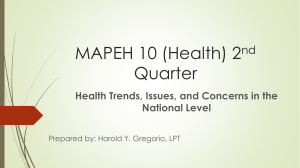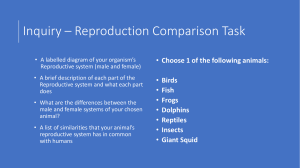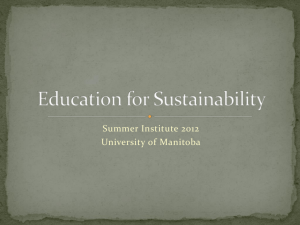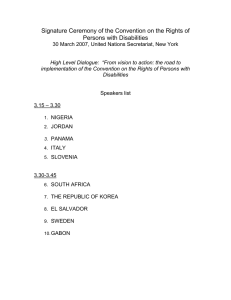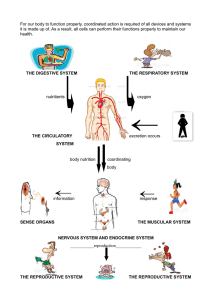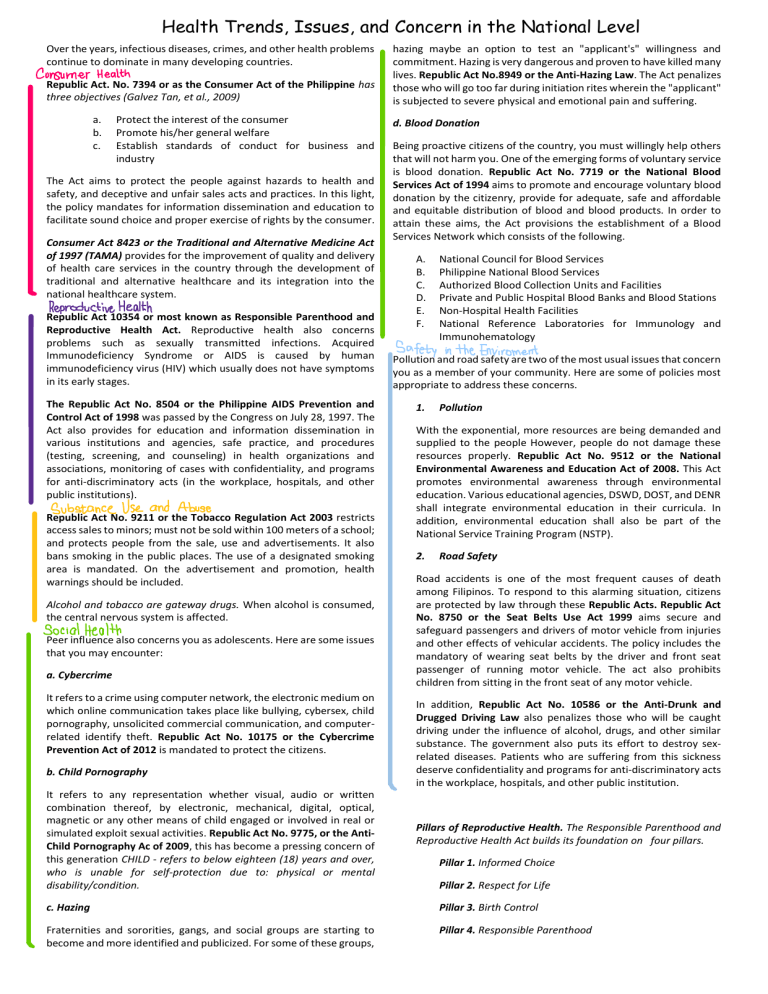
Health Trends, Issues, and Concern in the National Level Over the years, infectious diseases, crimes, and other health problems continue to dominate in many developing countries. Republic Act. No. 7394 or as the Consumer Act of the Philippine has three objectives (Galvez Tan, et al., 2009) a. b. c. Protect the interest of the consumer Promote his/her general welfare Establish standards of conduct for business and industry The Act aims to protect the people against hazards to health and safety, and deceptive and unfair sales acts and practices. In this light, the policy mandates for information dissemination and education to facilitate sound choice and proper exercise of rights by the consumer. Consumer Act 8423 or the Traditional and Alternative Medicine Act of 1997 (TAMA) provides for the improvement of quality and delivery of health care services in the country through the development of traditional and alternative healthcare and its integration into the national healthcare system. Republic Act 10354 or most known as Responsible Parenthood and Reproductive Health Act. Reproductive health also concerns problems such as sexually transmitted infections. Acquired Immunodeficiency Syndrome or AIDS is caused by human immunodeficiency virus (HIV) which usually does not have symptoms in its early stages. The Republic Act No. 8504 or the Philippine AIDS Prevention and Control Act of 1998 was passed by the Congress on July 28, 1997. The Act also provides for education and information dissemination in various institutions and agencies, safe practice, and procedures (testing, screening, and counseling) in health organizations and associations, monitoring of cases with confidentiality, and programs for anti-discriminatory acts (in the workplace, hospitals, and other public institutions). Republic Act No. 9211 or the Tobacco Regulation Act 2003 restricts access sales to minors; must not be sold within 100 meters of a school; and protects people from the sale, use and advertisements. It also bans smoking in the public places. The use of a designated smoking area is mandated. On the advertisement and promotion, health warnings should be included. Alcohol and tobacco are gateway drugs. When alcohol is consumed, the central nervous system is affected. Peer influence also concerns you as adolescents. Here are some issues that you may encounter: a. Cybercrime It refers to a crime using computer network, the electronic medium on which online communication takes place like bullying, cybersex, child pornography, unsolicited commercial communication, and computerrelated identify theft. Republic Act No. 10175 or the Cybercrime Prevention Act of 2012 is mandated to protect the citizens. b. Child Pornography It refers to any representation whether visual, audio or written combination thereof, by electronic, mechanical, digital, optical, magnetic or any other means of child engaged or involved in real or simulated exploit sexual activities. Republic Act No. 9775, or the AntiChild Pornography Ac of 2009, this has become a pressing concern of this generation CHILD - refers to below eighteen (18) years and over, who is unable for self-protection due to: physical or mental disability/condition. hazing maybe an option to test an "applicant's" willingness and commitment. Hazing is very dangerous and proven to have killed many lives. Republic Act No.8949 or the Anti-Hazing Law. The Act penalizes those who will go too far during initiation rites wherein the "applicant" is subjected to severe physical and emotional pain and suffering. d. Blood Donation Being proactive citizens of the country, you must willingly help others that will not harm you. One of the emerging forms of voluntary service is blood donation. Republic Act No. 7719 or the National Blood Services Act of 1994 aims to promote and encourage voluntary blood donation by the citizenry, provide for adequate, safe and affordable and equitable distribution of blood and blood products. In order to attain these aims, the Act provisions the establishment of a Blood Services Network which consists of the following. A. B. C. D. E. F. National Council for Blood Services Philippine National Blood Services Authorized Blood Collection Units and Facilities Private and Public Hospital Blood Banks and Blood Stations Non-Hospital Health Facilities National Reference Laboratories for Immunology and Immunohematology Pollution and road safety are two of the most usual issues that concern you as a member of your community. Here are some of policies most appropriate to address these concerns. 1. Pollution With the exponential, more resources are being demanded and supplied to the people However, people do not damage these resources properly. Republic Act No. 9512 or the National Environmental Awareness and Education Act of 2008. This Act promotes environmental awareness through environmental education. Various educational agencies, DSWD, DOST, and DENR shall integrate environmental education in their curricula. In addition, environmental education shall also be part of the National Service Training Program (NSTP). 2. Road Safety Road accidents is one of the most frequent causes of death among Filipinos. To respond to this alarming situation, citizens are protected by law through these Republic Acts. Republic Act No. 8750 or the Seat Belts Use Act 1999 aims secure and safeguard passengers and drivers of motor vehicle from injuries and other effects of vehicular accidents. The policy includes the mandatory of wearing seat belts by the driver and front seat passenger of running motor vehicle. The act also prohibits children from sitting in the front seat of any motor vehicle. In addition, Republic Act No. 10586 or the Anti-Drunk and Drugged Driving Law also penalizes those who will be caught driving under the influence of alcohol, drugs, and other similar substance. The government also puts its effort to destroy sexrelated diseases. Patients who are suffering from this sickness deserve confidentiality and programs for anti-discriminatory acts in the workplace, hospitals, and other public institution. Pillars of Reproductive Health. The Responsible Parenthood and Reproductive Health Act builds its foundation on four pillars. Pillar 1. Informed Choice Pillar 2. Respect for Life c. Hazing Pillar 3. Birth Control Fraternities and sororities, gangs, and social groups are starting to become and more identified and publicized. For some of these groups, Pillar 4. Responsible Parenthood Pillar 1: INFORMED CHOICE To ensure the health of the mother and the child, an effective and quality reproductive healthcare services, which are ethically and medically safe, legal, accessible, and affordable, shall be given primacy to them. The government shall also promote and provide unbiased information and access to these services. This pillar also covers the provision for the integration of reproductive health and sexuality education in schools, and other educational settings. Pillar 2: RESPECT FOR LIFE Consumer Act. Provides for the regulation of products and services being sold and offered in the country National Blood Services Act. Describes the blood donation program in the country Anti-Hazing Law. Prohibits physical and emotional harm and abuse as initiation to a certain social group Anti-Drunk and Drugged Driving Law. Penalizes vehicle drivers who are under the influence of drugs and alcohol Comprehensive Dangerous Drugs Act. Policy making and strategyformulating body in planning and formulation of policies and program on drug prevention and control. The Act recognizes that abortion is illegal and punishable by law. However, mothers who will be identified to have aborted an unborn child will be served with post-abortive treatment and counseling in a humane, nonjudgmental, and compassionate manner. Comprehensive Dangerous Drugs Act. Provides for the regulation of narcotic and other related substances being sold/imported in the country Pillar 3: BIRTH CONTROL Seat Belts Use Act. Penalizes vehicle users who will not wear safety belts while on the road Reproductive healthcare, information, and supplies shall be made available most especially to poor beneficiaries. However, the Act also provides that the government must respect the citizen’s individual preferences and choices of family planning method. Pillar 4: RESPONSIBLE PARENTHOOD Couples determine their ideal family size. In addition, the government shall equip each parent with needed information in all aspects of family life, reproductive health, and this pillar. Drug Classification Stimulants o o o o Caffeine Cocaine Ecstasy Tobacco Depressants o o o o Aerosol Barbiturates Valium Alcohol Inhalants o o o o Paints Paint thinner Gasoline Acetone National Environmental Awareness and Education Act. Provides for the inclusion of environmental education programs in various national institutions Tobacco Regulation Act. Supervises the legal production of cigarettes in the country Philippine AIDS Prevention and Control Act. Provides assistance for the prevention and control of AIDS Traditional and Alternative Medicines Act. Identifies scientifically proven herbs as medicinal plants Anti-Child Pornography Act. Protects children from any malicious acts online Cybercrime Prevention Act. Provides for criminal offenses committed online Responsible Parenthood and Reproductive Health Act. Provides for maternal and child healthcare, family planning, and responsible parenthood
